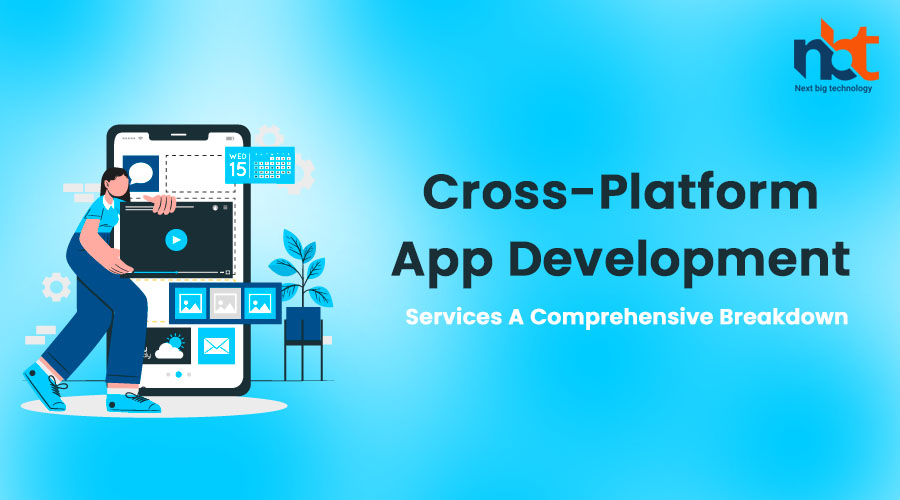Table of Contents
Introduction:
Cross-platform app development has gained significant popularity in recent years, allowing businesses to reach a wider audience by building mobile apps that can run on multiple platforms. With the ever-growing demand for mobile apps across iOS and Android platforms, cross-platform app development services offer a cost-effective and efficient solution. In this blog, we will provide a detailed breakdown of cross-platform app development services, exploring each aspect to help businesses understand the benefits and considerations of this approach.
Framework Selection:
a) React Native:
React Native is a widely adopted framework for cross-platform app development. It allows developers to write code in JavaScript and deploy it on both iOS and Android platforms. With React Native, businesses can leverage a single codebase to build native-like apps, achieving faster development cycles and cost efficiency.
b) Flutter:
Flutter is another popular cross-platform framework developed by Google. It uses Dart as its programming language and offers a rich set of pre-built UI components. Flutter enables businesses to build visually appealing and high-performance apps for iOS and Android platforms, maintaining a consistent user experience across devices.
c) Xamarin:
Xamarin, owned by Microsoft, allows developers to build cross-platform apps using C#. It offers a shared codebase, allowing businesses to maximize code reuse and reduce development time. Xamarin provides native-like performance and access to platform-specific APIs, enhancing app functionality and user experience.
UI/UX Design:
a) Responsive Design:
Cross-platform app development services focus on creating responsive designs that adapt to different screen sizes and resolutions. This ensures that the app provides a consistent user experience across various devices, including smartphones, tablets, and even desktops.
b) Customizable Themes and Styles:
Developers leverage UI component libraries and frameworks to create customizable themes and styles that align with the brand identity and user preferences. This allows businesses to create visually appealing and unique app interfaces while maintaining a consistent design language.
c) Native-like User Experience:
Cross-platform frameworks provide access to platform-specific APIs and functionalities, allowing developers to create native-like user experiences. This includes leveraging native gestures, animations, and navigation patterns, ensuring the app feels familiar and intuitive to users.
Code Reusability:
One of the primary advantages of cross-platform app development is the ability to reuse code across multiple platforms. This significantly reduces development time and costs. Developers can write a single codebase in a chosen programming language and deploy it on both iOS and Android platforms, optimizing resources and accelerating time to market.
Performance Optimization:
Cross-platform app development services prioritize performance optimization to ensure smooth and responsive app experiences. Developers employ techniques such as code optimization, memory management, and leveraging platform-specific optimizations to enhance app performance across devices.
Native Functionality Integration:
Cross-platform app development allows seamless integration of native functionalities and APIs. This includes accessing device features such as camera, GPS, accelerometer, and push notifications. By leveraging platform-specific APIs, businesses can provide rich and native-like experiences to their app users.
Testing and Debugging:
Cross-platform app development services include thorough testing and debugging to ensure app functionality and performance on various devices and operating systems. This involves compatibility testing, device-specific testing, and automated testing frameworks to identify and fix any issues or bugs.
Maintenance and Updates:
Cross-platform app development services provide ongoing maintenance and support for the app. This includes regular updates, bug fixes, and compatibility improvements to ensure the app remains compatible with the latest operating system versions and devices.
Conclusion:
Cross-platform app development services offer a cost-effective and efficient approach to building mobile apps that run seamlessly on multiple platforms. By leveraging frameworks like React Native, Flutter, or Xamarin, businesses can save development time and costs while maintaining a high-quality user experience. From framework selection to UI/UX design, code reusability, performance optimization, native functionality integration, testing, and maintenance, cross-platform app development services encompass a comprehensive range of expertise. By partnering with a professional cross-platform app development team, businesses can deliver successful mobile apps that engage users, expand their reach, and achieve their business goals in the competitive mobile app market.
Thanks for reading our post “Cross-Platform App Development Services: A Comprehensive Breakdown”. Please connect with us to know more about Cross platform app development services.










